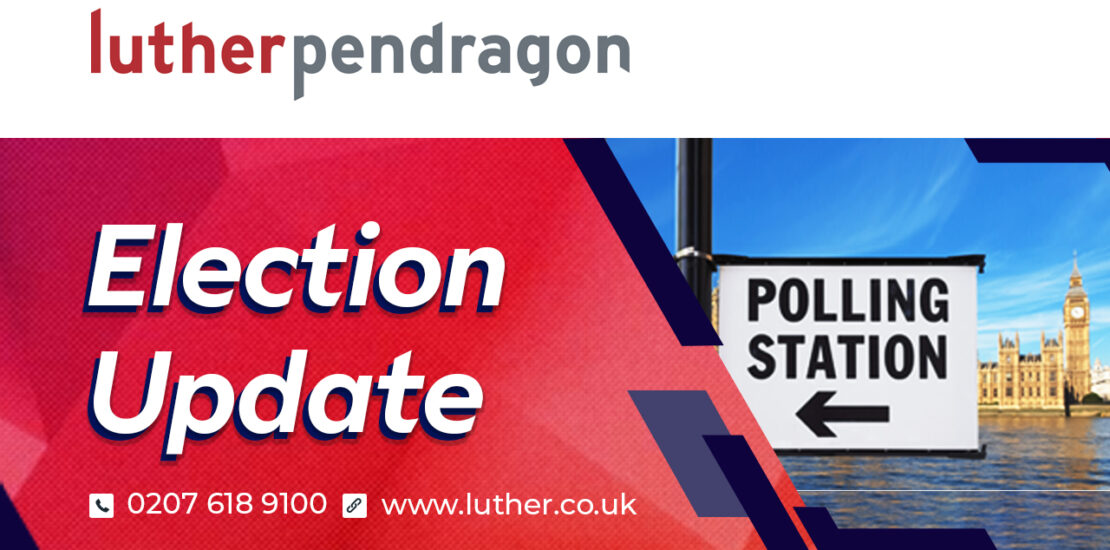- June 6, 2024
- Posted by: lutherpendragon
- Categories: insight, news

Welcome to Luther’s first weekly election update
While of course we love the cut and thrust of the election campaign, what we want to do with this email is not only share our thoughts on some of the key moments each week, but to really drill down and understand what it could mean post-election.
We hope you find this helpful in thinking through what happens after the election. If there’s anything here or that’s on your mind that you’d like to discuss further don’t hesitate to get in contact. We’d love to have a chat about how we can help!

Adam Thomas
Director and Head of Public Affairs
Farage injects energy into the campaign but what is his plan post-election?
Nigel Farage throwing his hat into the ring has livened up what was in danger of becoming a somewhat dull election campaign. It feels like very bad news for the Conservatives – see the latest YouGov poll – who were hoping that an early election would have caught Reform on the hop. Farage’s candidacy in Clacton will provide further newsworthy moments and, of course, becoming Reform UK leader now inserts him into the future TV leaders debates, going up against Mordaunt and Rayner – expect fireworks! But, perhaps the more interesting issue to ponder is Farage’s intentions post-election – whether or not he wins in Clacton he has committed to Reform for five years – what influence will he have on a likely depleted and demoralised Conservative Party post-election?
In Andrew Reid’s entertaining book on the makings of the Brexit Party, he comes to the conclusion that the best way to further Brexit is to take over a major party. In the immediate aftermath, Farage could certainly disrupt the Conservative Party Conference, which is likely to be a beauty parade to choose the next leader. Having seen firsthand the queues of Tory members desperate for Farage selfies at last year’s event, it sets up an interesting confrontation between a more centrist Conservative parliamentary party and its members…
Candidates to be confirmed this week – but what does it say about the future parliamentary parties?
The deadline for nomination papers is 4pm on Friday, when we’ll get final confirmation of all the candidates standing in each constituency. The shenanigans around last minute ‘selections’ have been well reported, most notably regarding Diane Abbott and Ric Holden’s quest for a seat. But we’ve been looking at the selections to consider what effect they will have on the complexion of the parliamentary parties, post-election.
A number of former Brown Ministers and advisers have got safe seats with a likely return of people like Douglas Alexander and Kirsty McNeill. Starmer loyalists from the National Executive Committee and Labour staffers have been parachuted into some of Labour’s safest seats. Many of the Labour MPs who gave up their safe seats are likely to be elevated to the Lords too. The last-minute nature of selections has also meant that an usually high number of Conservative special advisers and former advisers have made it through the selection process, most notably Sunak’s Deputy Chief of Staff Will Tanner who won on the first round in Bury St Edmunds.
While William Hague is worried about too many local campaigners getting seats, it looks like it may actually be a parliament dominated by party apparatchiks and professional politicians?
TV debates underscore the challenges ahead with Spending Review
During the TV debate on Tuesday, Keir Stamer recommitted a Labour Government to no further austerity, but given the Party’s pledges not to raise taxes beyond the measures already announced, there’s a big question about where this leaves future public spending under a Labour Government. The attention should now be on the Spending Review which will provide the financial underpinning for the new government, for the majority of the next parliament.
The Conservatives have already set the overall envelope which leaves non protected services facing cuts in their day-to-day budgets of over 3% – that’s c.£20 billion. If Labour is going to keep its promises on no more austerity and no major tax rises, that means some serious political trade-offs with little time to make those decisions. The next Spending Review must be in place before April 2025, but the reality is that it must be done well before that, to give other parts of the public sector budgetary certainty.
Spending Reviews are one of the most challenging and competitive processes within government and it’s not just about money but how every department sets their future strategies. Are you thinking ahead and planning for the Spending Review? Now is the time to get your plans in place.
A Labour tax bombshell or Tory distraction tactics?
The TV debate saw the Prime Minister repeatedly claim that the average household will see a £2000 rise in tax if Labour wins the election. The PM’s claim that the figure was arrived at through Treasury analysis preceded a rare public intervention from the Permanent Secretary to the Treasury, James Bowler, to deny official involvement in the numbers. The document which outlines the figures, however, is certainly worth taking a look at.
One item that struck us is the estimated cost of Labour’s little discussed insourcing plans – dubbed the “biggest wave of insourcing in a generation” – which the document states will cost £6.5 billion over the course of the Parliament. If Labour’s assumption is that the Government can deliver services cheaper than the private sector, organisations providing outsourced services must now get their evidence ready to demonstrate that they represent value for money.
Are Labour really united on defence? – Rayner’s confidence about her own position in government is growing
Despite Starmer’s best efforts to continue to distance his leadership from that of Jeremy Corbyn, illustrated this past week by commitments made on defence – including maintaining “an unshakeable commitment to NATO and our nuclear deterrent”, those efforts were undermined by an intervention by Labour’s Deputy Leader Angela Rayner.
While the prospect of 14 parliamentary candidates with defence backgrounds will give Starmer and his team cause for optimism should the Party be elected, the prospect of further disunity within his Shadow Cabinet will do quite the opposite, as will any undermining of his repeated message of “a changed Labour Party.” With the campaign still in its infancy and a little under a month to go until the polls open, message discipline will and should continue to be a focus.
Here comes the (behavioural) science bit…
While the first TV debate became a bit of a scrappy affair, Sunak arguably looked and sounded a little more prime ministerial. He built on his natural advantage as the incumbent, sounding more confident and succinct, particularly in the early stages of the discussion. Pollsters and political psychologists across the world know that decision making is often down to ‘change’ or ‘more of the same’, but another critical voting factor is who looks, or sounds, more prime ministerial or presidential. Starmer’s team will be looking to tighten up his delivery, both in terms of messaging and timing, for future debates.
What to look out for next week…
Next week we’re expecting the manifestos to land. Labour’s is likely to be a short document with little new policy, the Conservative manifesto, perhaps everything but the kitchen sink? What we’ll be looking at is the costing documents that have now become a mandatory part of the announcements. If you thought this week’s arguments over the £2000 tax figure was lively, then expect it to go up a gear.
How can we help you?
Luther Pendragon is one of the UK’s most highly-regarded independent communications consultancies. We help clients reach, inform and engage with policymakers and stakeholders in Government, Parliament, the devolved administrations, regulators, and beyond.
If your organisation is looking to shape the political and policymaking landscape after the General Election, we can support you.
Contact us at publicaffairs@luther.co.uk to find out more about how we can help.
